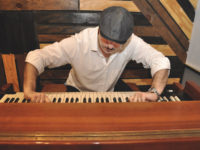source: http://www.kungfugue.com
In 2010, bassist extraordinaire William Parker quietly released an album of recordings called Uncle Joe’s Spirit House that put a different spin on organ jazz. Parker stayed put in his acoustic bass role instead of letting the organist take care of that and by doing that minor adjustment, rejiggered harmonic makeup of the music. It gave the music a somewhat exotic feel and helped make this release much more interesting and compelling than it would have otherwise been.
As a veteran Hammond B3 player, Brian Charette has done his share of traditional organ jazz records, and this Grammy-nominated artist has also lent his talents for Lou Donaldson, Rufus Wainwirght and Joni Mitchell. But for his latest one Music for Organ Sextette he decided to think outside the box as Parker did. No, not by hiring a bass player, Charette can handle that part with his feet just fine. But instead of only one or two horn players to front the drums and his organ, he expanded that front line to four horn players. A murderer’s row of exceptional such players, too: Jay Collins (flute/baritone saxophone) Mike DiRubbo (alto & soprano saxophone), Joel Frahm (tenor saxophone) and John Ellis (bass clarinet) make up the Formidable Four. Jochen Rueckert completes the Sextette on drums.
As a band made up of an organ with a quartet of wind instruments beside it, there’s all kinds of ways one can go about making music that way, and Charette has figured out just about every single one of them and put them on display on Sextette. Charette leads his band through the angular Larry Young modal-isms of “Computer God” (video of live performance below), the dancehall riddims of “Elvira Pacifier,” the perky swing of “Equal Opportunity,” the solemn pew-based sounds of “Prayer For An Agnostic,” the cold sweat James Brown funk that is “Late Night T.V.” and the avant leanings of “Mode For Sean Wayland.” The change ups in mode of attack makes for a fresh listening from beginning to end. Likewise, these horn players perform separately and together in ever changing roles. One of the niftiest moments comes in “Fugue For Kathleen Anne/Ex Girlfriend Variations” when each of the wind players improvise in graduated layers on top of each other, with Charette’s organ adding the last layer before it swells up for the final chorus.
The album holds together well even as each song mines a different style because of a couple of distinguishing features. First, the quartet of wind instruments are arranged in such a way as to not clutter the songs; this isn’t a small band trying to act like a big one, and the musicians stay nimble like a small one. Secondly, Charette is an intelligent composer, never leaning too heavily on simple riffs and always adds enough complexity in the harmony and tempos to make it interesting but engaging at the same time. Without any loss of groove factor, no less. Charette as an organ player is, as noted on our review of DiRubbo’s Chronos album, plays a distinctively cool style and even with the presence of so many other soloists, he gets his share in, too. The ones he delivers on “Equal Opportunity” and “French Birds” are particularly good showcases of his heady approach, and he can still play hot when he wants to, as he does at the end of “Risk.”
Brian Charette had a great idea to shake up the traditional organ combo format and offered something unique that succeeded not because of the idea, because the idea was executed so well. The year is still young, but it’s going to take an awfully good record to contain organ jazz better than that heard on Music for Organ Sextette.
Music for Organ Sextette was released last January by SteepleChase Records. Visit Brian Charette’s website.
[amazon_enhanced asin=”B006U120F6″ /] [amazon_enhanced asin=”B006S2XA9W” /] [amazon_enhanced asin=”B004LR5JVI” /] [amazon_enhanced asin=”B004IU5PJ4″ /] [amazon_enhanced asin=”B002MSG5Q6″ /] [amazon_enhanced asin=”B002MSG5Q6″ /] [amazon_enhanced asin=”B0016LR5TG” /] [amazon_enhanced asin=”B0002VJW6K” /]




Pingback: Brian Charette - 'Power From The Air' (2021) | Something Else!
Pingback: Brian Charette - 'Power From The Air' (2021) - 192kb